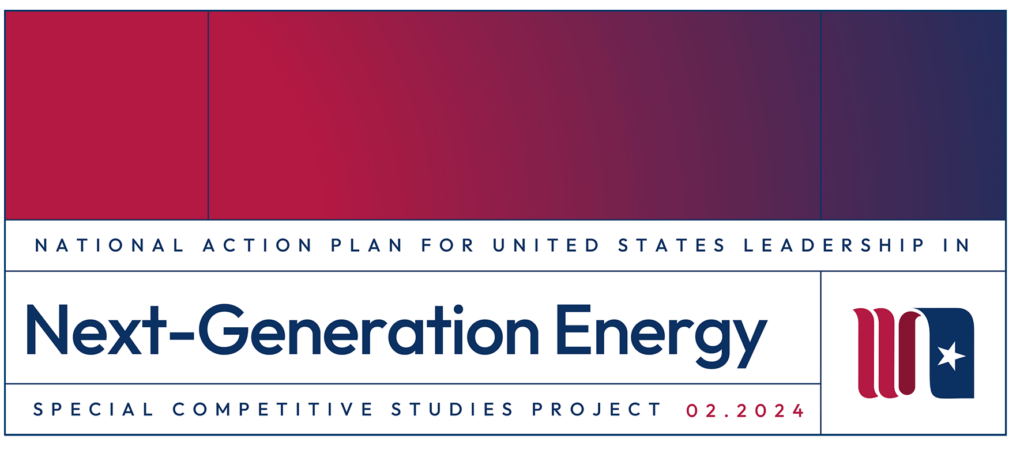America’s Lag in Next-Gen Energy Development Threatens U.S. Security
America is falling behind in the development and deployment of next-generation energy, and the country’s national security is at risk because of it. The United States and its allies are moving slowly on all aspects of energy, while other countries, like China, have worked hard on the problems of creating, storing, and moving energy. SCSP’s next-generation energy action plan says the race is just getting started. Now is the time for intense focus and greater collaboration to achieve energy superiority by 2030.
The Special Competitive Studies Project (SCSP), a Kiterocket client, tackles these issues and more in its “National Action Plan for U.S. Leadership in Next-Generation Energy“ report covering recommendations for national security in the context of energy. With the impending energy crisis and national security concerns, the next-generation energy action plan urges the United States to launch public-private programs for green energy research and plans for the country to deploy next-generation energy both in the near and long term. The plan outlines a strategic roadmap for the United States and its allies to dominate green energy in the next six years and maintain that dominance for the foreseeable future.

Solutions for Generating, Storing, and Transferring Energy Require Collaboration
The report urges the United States to push forward ambitious ‘moonshots’ like space-based solar power (SBSP). It reveals a possible and practical road for this effort, noting that we already have the collection technology and an existing platform, the International Space Station, upon which to build the infrastructure. The key challenge is bringing the energy to Earth, but SCSP is confident that, with intense focus, academia and the private and public sectors can achieve great things.
Fusion has long been understood as a potentially limitless supply of clean, green energy. The report theorizes that research into fusion can be accelerated by opening new collaborations between universities, institutions, and government agencies. The authors rightly reveal that current fusion research is siloed in individual labs in the academic, public, and private sectors to protect proprietary research, invention, and patents. The report calls on the government and private investors to incentivize collaboration, perhaps through grants, and share results to accelerate fusion development.
SCSP believes that research and innovation in energy storage and transportation will also benefit from collaboration. Increasing the length of time that energy can be stored will spur the development of more solar and wind farms. In the future, longer storage will create greater energy security for the United States and its allies, making our energy needs immune from geopolitical disruption and weather events and creating greater energy access around the world. This is also true of moving energy from remote locations around the grid. At present, moving energy is reliant on mid-20th century technology. The authors believe the country must do better, pointing out that the current grid is tenuous and vulnerable at best, dangerous at worst.
The Role of AI in Accelerating Innovation
The report reveals how artificial intelligence (AI) can exponentially quicken the pace of research by increasing the speed and collation of data, a critical issue in America’s ability to win the techno-economic competition in many sectors. Fast computing and data mining can spot gaps, uncover overlooked research, and locate trends. The report emphasizes the expansion of AI capabilities as a key driver of the development and deployment of next-generation energy. Related to this, SCSP also published a National Action Plan for United States Leadership in Advanced Compute and Microelectronics, which delves a bit more deeply into the need for high-performance computing and AI development.
Many of the issues highlighted in SCSP’s National Action Plan for U.S. Leadership in Next-Generation Energy will be front and center at its upcoming AI Expo for National Competitiveness, taking place in Washington, D.C., on May 7 and 8. The expo aims to enhance the country’s competitive edge by bringing together diverse industries, including energy, to showcase new technologies and new initiatives in AI. The event will unite industry leaders, research institutions, government officials, and allies to exchange ideas, strengthen partnerships, and educate the public on AI innovation. The event follows SCSP’s ultimate mission to ensure that America is positioned to win the techno-economic competition in a critical time frame.
Interested in learning more about the AI Expo? See what we’re up to here. Follow SCSP on the road to winning the AI race on Instagram and X.


